The Ultimate Guide to HVAC Systems For Rental Properties (Jaipur ,Rajasthan )
The Ultimate Guide to HVAC Systems For Rental Properties
- How to perform regularly-scheduled maintenance
- How to make purchase decisions for system replacement
- And how to avoid common HVAC problems that could cost you money
I hope this information will help your rental investments become more attractive for your tenants and more profitable for you.
Recommended Maintenance Schedule for HVAC Systems
If you’d like to pay a little bit now to save a lot later, you will want to implement a regular HVAC maintenance schedule for your rental units.
Any system is going to have a limited lifespan, but you can help prevent premature failure with a solid maintenance schedule in place. This can defer the costly replacement of an entire system for many years.
Now let’s look at some examples of routine maintenance you can perform to keep everything in working order. If you have the skills, you can do much of this yourself. Of course, you could also hire an HVAC professional to handle them on a regular basis.
Replace Air Filters
First, make sure all of your air filters are the correct size and then replace them regularly as necessary. Clean and check the filters until their lifespan has come to an end. Keep a supply of air filters on hand for quick replacement. Generally, they’re not costly.
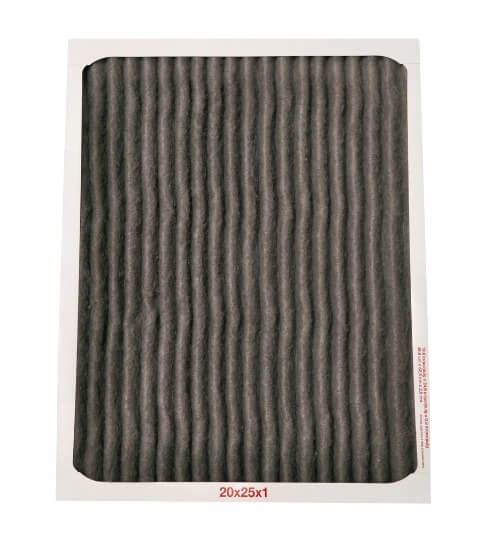
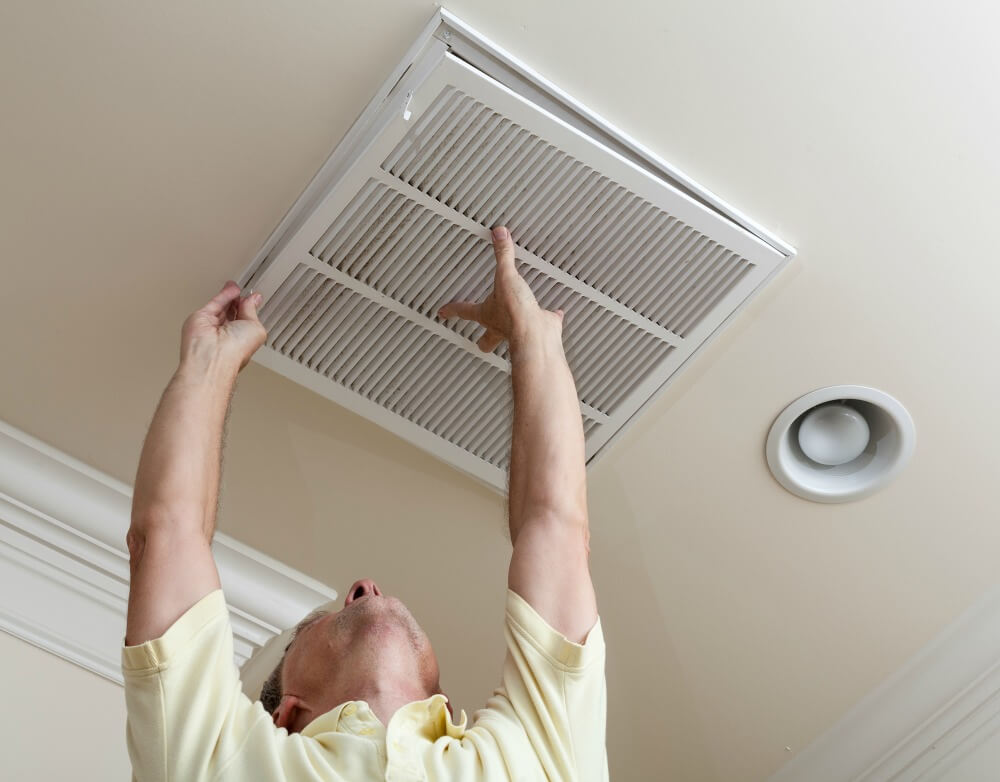
Check Belts and Bearings
Belt misalignment can cause the belt to wear out and groove the pulley. Check to make sure your belts have a straight edge and clean them regularly.
It’s also important to clean and check the bearings. Bearings should be properly greased to ensure no metal- to-metal contact is grinding down the equipment.
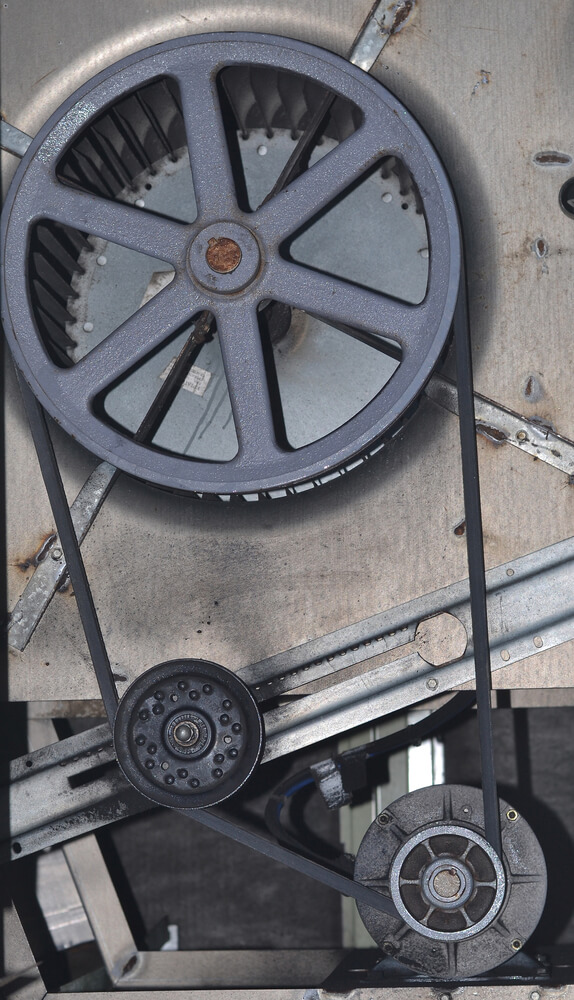
Clean Air Ducts
Take a look at your air ducts and see what kind of debris is accumulating on them. Now imagine breathing in that dirt, dust, and pollen on a daily basis. Anything in your building’s air ducts will end up in your tenant’s respiratory systems. Performing routine cleanings can keep air quality in your units high.
Clean Units
Keeping every piece of equipment clean is imperative when maintaining HVAC systems for the purpose of longevity and air quality. Having messy units puts your tenants at risk and can create expensive future problems. Use brushes, power washers, and vacuums to detail the equipment on a regular basis.
Remove Standing Water
Standing water can become a breeding ground for bacteria and contaminants. It is important to frequently get rid of the water collecting in your building’s drain pans and other humidity-moderating units.
Replacing HVAC Systems in Your Rental
Average Lifespan of Units
Manufacturers of light-commercial HVAC equipment for single-family or small multi-family build them to last an average of 15 to 20 years. But there are contributing factors that might cause an “early death.”
Equipment inherited from previous owners may not have been well maintained over the years. Weather can be another factor that determines lifespan. For instance, was the equipment located on the rooftop exposed to harsh elements?
[Chad: I’ve owned property long enough now to experience the cost of cheap equipment. I installed lower-end heat pump units in a 4-plex, and 8-9 years later every single one had to be replaced. Needless to say, I would have been better off with a higher-quality unit that lasted for 15 years or more.]
Estimating Costs Now & in the Future
When you’re considering a replacement of an HVAC unit, begin by looking at your current operating expenses. Measure them against your projected expenses taking into account the new equipment.
Will there be a long-term return on your investment (ROI) with this new equipment? Do you need a new type of unit or are you just upgrading to the latest model?
Having a new unit with better energy efficiency can lower utility costs and end up paying for itself in a few years. If you’re the owner of a larger complex with a centralized HVAC system, you’ll see the savings directly.
But even if your tenants pay their utility bills on their own, they’ll be happier – and therefore more likely to stay – if they’re not overpaying for their heating and AC.
Also, don’t forget to take into account any tax rebates available to you when you replace units. Rebates can change year-to-year, so be sure to keep your eyes and ears open.
Getting a Quote From a Respectable Contractor
Whether you decide to repair or replace, it is important you receive a solid quote from your contractor so you aren’t caught off guard by the bill.
Be sure to carefully select the contractor that will be performing the new installation, and make sure that he is certified and respected in the local community. Keep records that detail the project expenses, information about the new unit, and estimate future expenses. Then, work the replaced (or repaired) unit into your maintenance schedule to ensure a long lifespan.
[Chad: Unless you are very familiar with current prices, I recommend you get 2-3 quotes before deciding on a system. Ask questions and make sure you’re comparing apples to apples. Sometimes it’s difficult to tell why one system is better or worse than another, but the more questions you ask the clearer it becomes.]
Choosing the Type of HVAC System to Buy
There are such a variety of units available on the market now. Three of the main choices you’ll make are the following:
- Split vs Packaged Systems
- Furnace vs Heat Pumps vs Duel Fuel for Heating
- Ducts vs Ductless Systems
Split vs. Packaged Systems
There are basically two types of AC/furnace units that are available: packaged and split. And the difference is just about as basic as the name. Both options are available for heat pumps, but you also have the option of supplementing that with a gas furnace as part of the same unit.
Packaged Systems
In a packaged system, everything’s in one place. All that’s needed is to hook it up to your duct system and it’s ready to go (not quite as easy as it sounds, but still not complicated). A package system ships with everything included and even the refrigerant is already charged.
But that simplicity has its downside as well. That “one place” where the package unit is installed is outdoors. That means it’s subjected to the elements and also makes for a warm shelter for critters. For this reason, these package units are usually best for the Southern states that don’t experience the harshest winters.
Split Systems
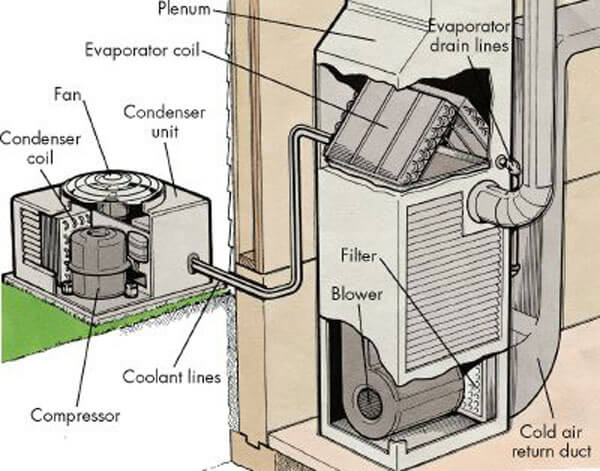
For a split system, part of the unit can be indoors, usually in a basement, crawl space, or attic. Like packaged units, a split unit may be an air conditioner or a combination heating/cooling unit. The heating unit is often a gas-powered furnace.
Outdoors, you’ll find the compressor and condenser. The inside unit contains the air handling unit, heater, and filter. Because much of the system’s delicate electronics are sheltered indoors, it tends to last longer than package units. It also generally has a higher energy-efficiency rating.
Split systems are a bit more complex to install. They have to be connected to each other with pipework. Components are more dependent on proper installation and positioning, to make sure everything flows in the right direction. However, that’s more an issue with making sure you have a good contractor than with the system itself.
If you’re faced with issues with your current split or packaged unit, you’re usually better off sticking with what you already have. It’s not worth the expense of changing over. However, if you need to start from scratch, a split system is generally better, as long as you have the space for it.
Furnace vs Heat Pumps vs Dual Fuel for Heating
Whether you use a split or a package unit, you can decide to install a furnace heater (usually fueled by gas or oil), an electric heat pump, or a dual fuel system.
A furnace heating system includes a separate component that burns gas or oil to heat the air. This is separate from the air conditioning unit, but it uses the same air ducts to distribute the air.
An electric heater is part of the same heat pump system that cools the air during the summer. A reversing valve simply switches the system from cooling to heating.
And a dual fuel system combines both systems. They can be programmed to automatically use one fuel system or the other at different optimal temperature levels.
For locations that get extremely cold in winter, an oil or gas furnace or a dual fuel system will probably be the best option because electric heat pumps do not work as well at low temperatures. In coastal or southern regions with more mild winters, heat pumps may work fine.
Duct vs Ductless Systems
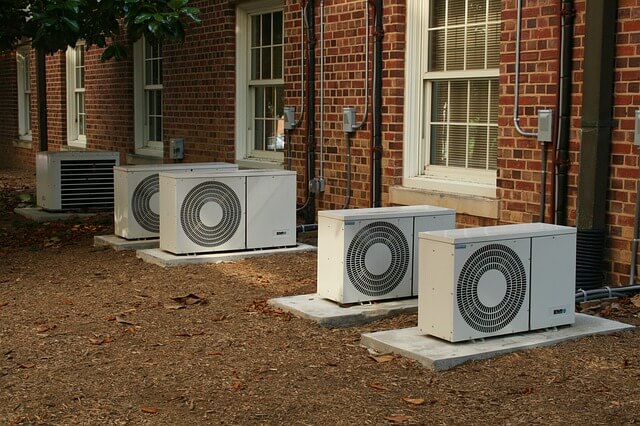
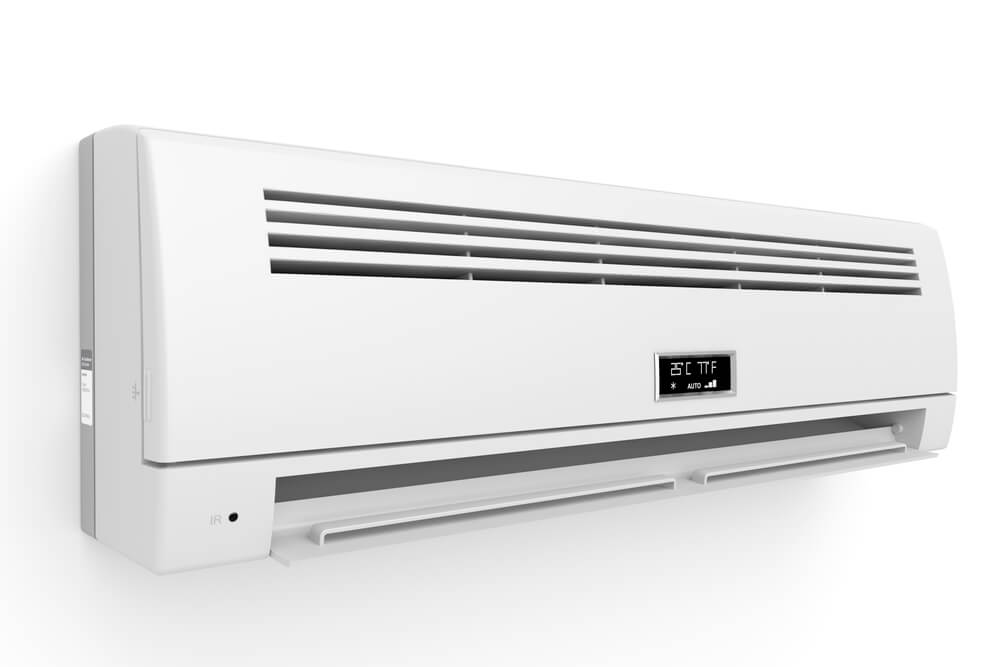
Ductless systems are HVAC systems that do not have ducts to distribute air. Instead, an outdoor unit condenses and cools a refrigerant, which is then connected by a relatively small line to an indoor unit.
These systems are often used in hotels and multi-unit buildings because of the ability to give individualized control to each unit. It’s also used in retrofitted older buildings with no space to install large air ducts.
Ductless systems are typically higher priced than traditional systems with air ducts. So, if individualized control or space is not an issue, an air duct system may make more sense.
Investing In a Warranty Program
Another way to get a return on your investment is to purchase warranties that will cover repairs over the years. Getting an extending warranty paired with a scheduled maintenance program can keep your equipment in tip-top shape.
Be sure to negotiate with your manufacturer or vendor about the price of the warranty program.
**UPDATE** Since I wrote this article I corresponded with another blogger/real estate investor who wrote a great article on a guide to buying a central HVAC system. It adds to what you’ve already read here.
How to Access an Existing Heating & Air System
To properly assess a property’s heating & air system, it is crucial to know the building’s history. The more you know the better you will be able to project future costs.
Map Out The Systems
You may want to call an HVAC contractor or engineer to come in and help you map out the systems and advise you on the efficiency of current vent placement. Ask the previous owner for any maps they can offer. A map will give you a bird’s eye overview to start working with.
It can also be especially important if your building’s configuration has changed. For example, were the units divided differently at some point? Or if it’s a single-family dwelling, were there any additions or walls moved or opened up?
These factors can have a substantial effect on efficiency.
Determine The Age Of Units
Many building owners keep records and warranties for the equipment they have purchased over the years. Try to find out how old units are so you can determine how much longer they will last.
Do any need to be replaced immediately? Of course, this is something you want to estimate up front if you are purchasing a building.
In addition to their age, you should also pay attention to how well the HVAC system was maintained. Even a quick glance at their condition can give a general idea of how well they’ve been cared for.
Ask For Maintenance Logs
If the property had a maintenance team or professionals regularly coming in, there should be an existing maintenance log. Ask for copies or take pictures of the logs so you can accurately assess how well the building has been maintained.
If there are no logs available, this is a sign. You will probably have a lot more initial repairs and replacements to do. And I’m strongly implying here that you should have your staff keep a log if they don’t already!
Save For the Future (i.e. Create a Capital Budget)
Heating and air system replacement is not cheap. So, any owner of a rental property should create a capital budget to plan for future cash needs.
Estimate when you’re going to need certain major improvements. Evaluate the initial costs you will need to put into the property to make the HVAC system safe and efficient. Then project the future costs of repairs or replacement.
[Chad: This is a very smart idea. To get more accurate, create a capital budget spreadsheet. Get a replacement cost quote today, and then estimate the lifespan of the unit. Next apply a rate of inflation to today’s cost. You can divide this future cost by the number of months or years you have before replacement. This will tell you the monthly or yearly capital savings budget you need to set aside. It may not be 100% accurate, but it will get you close.]HVAC Issues & Red Flags to Watch Out For
If you are shopping around for properties, have just purchased one, or are looking hard at the state of your current investments, it is important to look out for a few key factors and common HVAC problems.
Centralized vs Decentralized Units
Multi-family properties either have centralized or decentralized systems.
Centralized systems are more common in larger buildings and work to cool/heat from a centralized point in the building. These are much more expensive to install but are more cost-effective in the long run.
On the downside, the number-one complaint that property owners receive from tenants of centralized systems is temperature control. Keeping people with different preferences happy may not be easy.
Decentralized units offer each unit its own system, which creates a self-contained temperature for every household. They are cheaper to install but less energy efficient.
If your property already has centralized units, you are in luck! You will save money on the installation and reap the benefits from the energy savings.
If there are already decentralized units you will have to consider installing a new system or dealing with high energy costs, but you may have happier tenants.
[Chad: I have always had decentralized systems. I can see advantages and disadvantages to both. Decentralized systems cost a lot more to install up front, but the tenant’s pay the electric or gas bill each month. So, the net comparison may be difficult to make over the long run. I also prefer not to have the hassle of keeping tenants happy with the temperature. But other landlords might have had ok experiences with this.]
Bad Odors From Vents
Smell something bad near a vent? An animal may have died inside a vent or duct. It’s also possible the filters just haven’t been changed.
If you walk into a property and smell that something is amiss, you may want to hire a contractor to come pinpoint the problem. Check and change out the filters if necessary. Make sure the filters are the correct size to prevent dirt from getting into the main unit.
If the smell persists, you may have a bigger, more hazardous issue on your hands like air contamination. That is why it is important to call a professional if the problem is not the filters.
Uneven Heating/Cooling
Some units and rooms in the building might be hotter or colder than is comfortable for tenants. These hot or cold spots can be caused by renovations to the building’s layout without subsequent updates to the heating/cooling systems to accommodate the changes.
Putting up or knocking down walls can dramatically affect ventilation and airflow. Know the building’s renovation history and talk to tenants. You may want to hire a contractor to help you rethink vent placement.
Low Vent Airflow
If the fans are on high but little to no air is circulating out of the vents, you may have ductwork that wasn’t properly sealed. This can be an expensive repair to make since it can involve opening up walls to reseal the ducts.
Getting out the sledgehammer should be a last resort. Try alternative fixes first and bring in a professional to assess the situation.
In-House Maintenance Team
Was the property previously maintained by internally hired caretakers, DIYers, and handymen? That can be fine for some aspects of maintenance, but HVAC is specialized. An unqualified handyman could easily miss major problems.
If management hasn’t used professional HVAC technicians to repair and maintain the units, watch out for the shoddy upkeep of the equipment. If you inherit this system, you might end up footing the bill to hire professionals to properly fix issues.
I like a handyman who isn’t afraid to admit when something is beyond his ability. There is nothing wrong with calling in the specialists. Again, it’s a short-term cost geared at long-term savings.
Conclusion
HVAC systems often seem complex and expensive to rental property investors. But by following the tips I provided in this guide, you can turn them into a manageable part of your investing system.
If you survey your current situation, gather whatever information you can on the property’s history, and carefully consider the main factors, you can make your property investment more profitable.
And remember, don’t shy away from investing in new HVAC equipment. Be sure to take into account future savings and renter happiness. Having good air quality and temperature control in your property units keep tenants happy and safe.
Best of luck with your rental properties and HVAC systems!
[Chad: Thank you to Bob for this excellent guide! I really appreciate the time he put into customizing his advice for our particular needs with rental properties. Below you can connect with Bob and follow his blog about HVAC systems:
Bob Wells is a retired HVAC tech who now dedicates himself to sharing knowledge on his website hvactraining101.com. Bob worked over 30 years in the field, 23 of which he ran his own contracting business. He’s dedicated to keeping up with the latest developments in the field and helping others to learn the trade better and advance their own careers.
*AC Installation in JAIPUR Find the best ✓AC Repair ✓AC Installation ✓ AC Un-Installation ✓AC Gas filling for ✓Split AC✓ Window AC in #Offices, #Shops, #Showrooms, #Hotels, #Buildings, #CommercialBuildings, #Flats, #Apartments, #Villas and other premises. Call/ Whatsapp : 8890936664*
0141- 4922056, +91-9829049718, +91- 8890936664

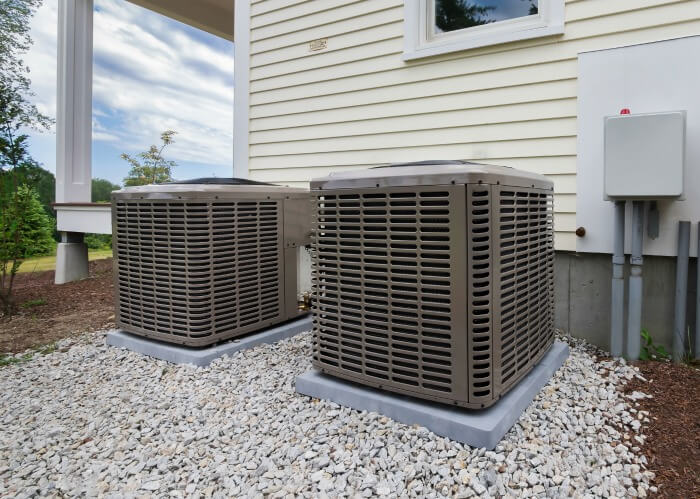

Comments
Post a Comment